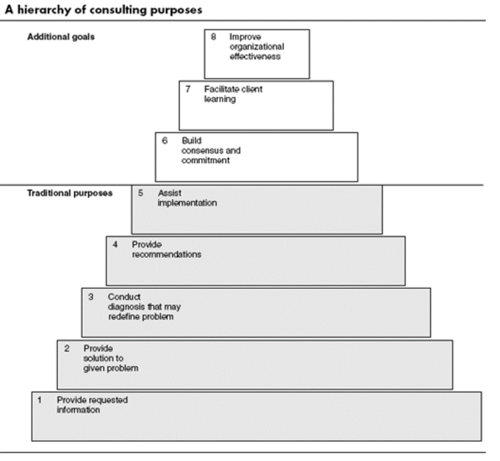Management Consulting
Management Consulting is the practice of helping organizations to improve their performance, primarily through the analysis of existing organizational problems and development of plans for improvement. Organizations may draw upon the services of management consultants for a number of reasons, including gaining external advice and access to the consultants' specialised expertise. As a result of their exposure to and relationships with numerous organizations, consulting firms are also said to be aware of industry "best practices", although the transferability of such practices from one organization to another may be limited by the specific nature of situation under consideration. Consultancies may also provide organizational change management assistance, development of coaching skills, technology implementation, strategy development, or operational improvement services. Management consultants often bring their own proprietary methodologies or frameworks to guide the identification of problems, and to serve as the basis for recommendations for more effective or efficient ways of performing work tasks.[1]
Management Consulting Objectives[2]
Management consulting includes a broad range of activities, and the many firms and their members often define these practices quite differently. One way to categorize the activities is in terms of the professional’s area of expertise (such as competitive analysis, corporate strategy, operations management, or human resources). But in practice, as many differences exist within these categories as between them. Another approach is to view the process as a sequence of phases—entry, contracting, diagnosis, data collection, feedback, implementation, and so on. However, these phases are usually less discrete than most consultants admit.
Perhaps a more useful way of analyzing the process is to consider its purposes; clarity about goals certainly influences an engagement’s success. Here are consulting’s eight fundamental objectives, arranged hierarchically (see the figure below):

source: Harvard Business Reviw
1. Providing information to a client.
2. Solving a client’s problems.
3. Making a diagnosis, which may necessitate redefinition of the problem.
4. Making recommendations based on the diagnosis.
5. Assisting with implementation of recommended solutions.
6. Building a consensus and commitment around corrective action.
7. Facilitating client learning—that is, teaching clients how to resolve similar problems in the future.
8. Permanently improving organizational effectiveness.
The lower-numbered purposes are better understood and practiced and are also more requested by clients. Many consultants, however, aspire to a higher stage on the pyramid than most of their engagements achieve.
Purposes 1 through 5 are generally considered legitimate functions, though some controversy surrounds purpose 5. Management consultants are less likely to address purposes 6 through 8 explicitly, and their clients are not as likely to request them. But leading firms and their clients are beginning to approach lower-numbered purposes in ways that involve the other goals as well. Goals 6 through 8 are best considered by-products of earlier purposes, not additional objectives that become relevant only when the other purposes have been achieved. They are essential to effective consulting even if not recognized as explicit goals when the engagement begins.
Moving up the pyramid toward more ambitious purposes requires increasing sophistication and skill in the processes of consulting and in managing the consultant-client relationship. Sometimes a professional tries to shift the purpose of an engagement even though a shift is not called for; the firm may have lost track of the line between what’s best for the client and what’s best for the consultant’s business. But reputable consultants do not usually try to prolong engagements or enlarge their scope. Wherever on the pyramid the relationship starts, the outsider’s first job is to address the purpose the client requests. As the need arises, both parties may agree to move to other goals.
The Main Management Consulting Firms[3]
There are three companies which are often referred to as the Big Three consulting firms. They include McKinsey & Company, Boston Consulting Group and Bain & Company. They all consult on a variety of projects and specialisms.
The Big Four accountancy firms (PwC, EY, Deloitte and KPMG) also have large management consulting arms, plus there are other firms like CIL Management Consultants and Steer, which specialise in management consulting.
- ↑ Definition - What is Management Consulting? Definitions
- ↑ A Hierarchy of Purposes of Management Consulting hbr.org
- ↑ Who are the main management consulting firms? Bright Network
